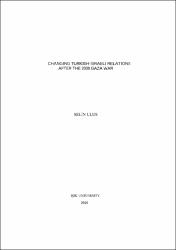| dc.contributor.advisor | Kayhan Pusane, Özlem | en_US |
| dc.contributor.author | Ulus, Selin | en_US |
| dc.contributor.other | Işık Üniversitesi, Sosyal Bilimler Enstitüsü, Uluslararası İlişkiler Yüksek Lisans Programı | en_US |
| dc.date.accessioned | 2016-10-13T09:24:21Z | |
| dc.date.available | 2016-10-13T09:24:21Z | |
| dc.date.issued | 2016-08-23 | |
| dc.identifier.citation | Ulus, S. (2016). Changing Turkish-Israeli relations after the 2008 Gaza war. İstanbul: Işık Üniversitesi Sosyal Bilimler Enstitüsü. | en_US |
| dc.identifier.uri | https://hdl.handle.net/11729/1124 | |
| dc.description | Text in English ; Abstract: English and Turkish | en_US |
| dc.description | Includes bibliographical references (leaves 72-87) | en_US |
| dc.description | ix, 89 leaves | en_US |
| dc.description.abstract | This thesis examines the deterioration of Turkish-Israeli relations after Israel’s Operation Cast Lead against Gaza in 2008. It explains the changing Turkish-Israeli relationship in light of Jakob Gustavsson’s model of foreign policy change, that is, by both considering the structural factors of the period and by analyzing the role of Recep Tayyip Erdoğan as the Prime Minister. This thesis argues that although a number of structural factors constituted a ground for the deterioration of TurkishIsraeli relations from the late 1990s and early 2000s onwards, relations were on a relatively positive track following the foundation of the Justice and Development Party (JDP), and there was no radical change in the relationship until 2008. However, Israel’s Gaza operation in 2008 received a very harsh response from the then Prime Minister Recep Tayyip Erdoğan and brought the Turkish-Israeli relationship to a critical level. In the aftermath of the Operation Cast Lead, Erdoğan's ideology, which has its roots in the National Outlook (Milli Görüş) tradition, as well as his personality traits played an important role in bringing the Turkish-Israeli relations to the point of rupture. | en_US |
| dc.description.abstract | Bu tez, 2008 yılında İsrail’in Gazze’ye karşı yaptığı Dökme Kurşun Operasyonu sonrasında bozulan Türkiye-İsrail ilişkilerini ele almaktadır. Tez, Jakob Gustavsson’un dış politika değişim modeli ışığında değişen Türkiye-İsrail ilişkilerini dönemin yapısal faktörlerini ve Başbakan Recep Tayyip Erdoğan’ın rolünü analiz ederek açıklamaktadır. 1990’ların sonlarından 2000’lerin başlarına kadar çeşitli yapısal faktörler Türkiye-İsrail ilişkilerin bozulmasına bir zemin oluşturmuşsa da Adalet ve Kalkınma Partisi’nin (AKP) kurulmasını izleyen dönemde ilişkiler nispeten olumlu rotada ilerlemiş ve 2008 yılına kadar herhangi bir radikal değişim göstermemiştir. Ancak, İsrail’in 2008 yılındaki Gazze operasyonu Başbakan Recep Tayyip Erdoğan tarafından çok sert tepki almış ve bu durum Türk-İsrail ilişkilerini kritik bir seviyeye getirmiştir. Dökme Kurşun Operasyonu sonrasında Türkiye-İsrail ilişkilerinin kopma noktasına gelmesinde Erdoğan’ın kişisel özelliklerinin yanısıra Milli Görüş kökeninden gelen ideolojisi de önemli bir rol oynamıştır. | en_US |
| dc.description.tableofcontents | Introduction and Research Design | en_US |
| dc.description.tableofcontents | Research Question and Argument in Brief | en_US |
| dc.description.tableofcontents | Literature Review | en_US |
| dc.description.tableofcontents | Causal Mechanism | en_US |
| dc.description.tableofcontents | Methodology | en_US |
| dc.description.tableofcontents | Organization of the Chapters | en_US |
| dc.description.tableofcontents | Historical Background | en_US |
| dc.description.tableofcontents | Turkish-Israeli Relations between 1948-1990 | en_US |
| dc.description.tableofcontents | The Honeymoon Years in Turkish-Israeli Relations (1990-2008) | en_US |
| dc.description.tableofcontents | The Breakdown of Turkish-Israeli Relations and the Recent Normalization Process (2008 – present) | en_US |
| dc.description.tableofcontents | The Impact of Structural Factors on the Deterioration of Turkish-Israeli Relations | en_US |
| dc.description.tableofcontents | Regional Dynamics | en_US |
| dc.description.tableofcontents | Changing Turkey-EU Relations | en_US |
| dc.description.tableofcontents | The US Global War on Terror | en_US |
| dc.description.tableofcontents | Domestic Structural Factors (Economics and Politics) | en_US |
| dc.description.tableofcontents | Structural Factors which Provided a Context for the Deterioration of Turkish-Israeli Relations | en_US |
| dc.description.tableofcontents | The Impact of Tayyip Erdoğan’s Role as an Individual Leader in the Deterioration of Relations between Turkey and Israel | en_US |
| dc.description.tableofcontents | Tayyip Erdoğan’s Discourse about Israel before and after the 2008 Gaza War | en_US |
| dc.description.tableofcontents | Erdoğan’s Ideology and Personality in the Decision Making Process | en_US |
| dc.description.tableofcontents | Conclusion | en_US |
| dc.description.tableofcontents | Summary and Discussion of the Findings | en_US |
| dc.description.tableofcontents | Further Research | en_US |
| dc.language.iso | eng | en_US |
| dc.publisher | Işık Üniversitesi | en_US |
| dc.rights | info:eu-repo/semantics/openAccess | en_US |
| dc.rights | Attribution-NonCommercial-NoDerivs 3.0 United States | * |
| dc.rights.uri | http://creativecommons.org/licenses/by-nc-nd/3.0/us/ | * |
| dc.subject | Foreign policy change | en_US |
| dc.subject | Operation cast lead | en_US |
| dc.subject | Turkish-Israeli relations | en_US |
| dc.subject | Dış politika değişimi | en_US |
| dc.subject | Dökme kurşun operasyonu | en_US |
| dc.subject | Recep Tayyip Erdoğan | en_US |
| dc.subject | Türkiye-İsrail ilişkileri | en_US |
| dc.subject.lcc | DS119.8.T9 U48 2016 | |
| dc.subject.lcsh | Gaza War, 2008-2009. | en_US |
| dc.title | Changing Turkish-Israeli relations after the 2008 Gaza war | en_US |
| dc.title.alternative | 2008 yılı Gazze savaşı sonrası Türkiye-İsrail ilişkilerindeki değişim | en_US |
| dc.type | masterThesis | en_US |
| dc.contributor.department | Işık Üniversitesi, Sosyal Bilimler Enstitüsü, Uluslararası İlişkiler Yüksek Lisans Programı | en_US |
| dc.relation.publicationcategory | Tez | en_US |
| dc.contributor.institutionauthor | Ulus, Selin | en_US |



















